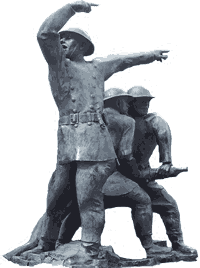A CONFERENCE SPONSORED BY THE CENTRE FOR METROPOLITAN HISTORY, WITH SUPPORT FROM THE LEVERHULME TRUST

Metropolitan
Catastrophes
Scenarios, Experiences and
Commemorations in the
Era of Total War
Institute
of Historical Research
Senate House, Malet Street, London WC1E 7HU
Monday 12 July - Tuesday 13 July 2004
Total war blurred the boundaries between home and front and transformed cities into battlefields. This conference explores the cultural imprint of military conflict on metropolises worldwide over a long time-span and provides a forum for the interchange of ideas on the comparative history of metropolises and wars.
Programme
Monday 12 July
| 9.15 | Registration |
| 9.30 | Derek
Keene and Stefan Goebel (CMH) Introduction |
| 9.40 |
Eric Homberger (University of East Anglia) Dress-rehearsal for catastrophe: New York City, 1863 |
| 10.20 |
Carl Abbott (Portland State University) Big blowups and quiet catastrophes: imagining the death of American cities Susan Grayzel (University of Mississippi) ‘A promise of terror to come’: the threat of air power and the destruction of cities in British imagination and experience, 1908-1939 |
| 11.30 | Coffee |
| 11.50 | Keynote:
Patrice Higonnet (Harvard University) Paris under the impact of total war |
| 12.50 | Lunch |
| 14.00 | Roxanne
Panchasi (Simon Fraser University) The Seine is burning: mapping catastrophe in interwar Paris Janet Ward (University of Nevada, Las Vegas) On the transformative challenge of urban catastrophe |
| 14.45 | Keynote:
Jay Winter (Yale University) Configuring catastrophe: Paris, London, Berlin 1914–1919 |
| 15.45 | Keith
Grieves (Kingston University) Experiencing the relational difference of life in metropolitan London and the countryside in two world wars |
| 16.15 | Tea |
| 16.45 |
Peter Stansky
(Stanford University) |
| 17.40 | Keynote:
Antony Beevor (London) Stalingrad and Berlin – total warfare in a city? |
| 18.30 | Reception, IHR Common Room |
Tuesday 13 July
| 9.15 | Maureen
Healy (Oregon State University) Total war and local space: Vienna in the two world wars |
| 10.00 | Tim Cole (University of Bristol) Ghettos and the remaking of urban space: a comparative study of Hungarian cities, 1944 |
| 10.40 | Coffee |
| 11.10 |
Bernhard
Rieger (International University Bremen) Julie Higashi
and Lim, Bon (Ritsumeikan University, Kyoto) |
| 12.20 | Lunch |
| 13.30 | Keynote:
Lisa Yoneyama (University of California, San Diego) Memories in ruins: politics of remembering and forgetting Hiroshima’s atomic annihilation |
| 14.30 | Parallel
sessions: Session 1. International Relations Room Eyal Ginio (Hebrew University of Jerusalem) Transmitting the agony of a besieged population: Edirne (Adrianople) in Ottoman propaganda during the Balkan Wars, 1912–1913 Jovana L. Knezevic (Yale University) News, propaganda, mail and rumors in occupied Belgrade, 1915–1918 Mark R. Hatlie (Tübingen University) Re-mapping Riga: sudden regime change during war and revolution Session 2. Wolfson Room Clara M. Oberle (Princeton University) Times of transit, spaces of transit: train stations in Berlin, 1945–1949 Daniel Prosterman (New York University) New York City and the American homefront: local politics, world war, and the spectre of totalitarianism, 1933–1947 |
| 15.30 | Tea |
| 15.50 | Joe
L. Nasr and Peter J. Larkham (University of Central England) From vestiges to mementoes: the treatment of churches and other special buildings after the Second World War Fiona Henderson (Royal Holloway, University of London) Gazing at ruins: the politics and poetics of bombsite tourism in London and Berlin post-1945 |
| 16.50 | Stefan
Goebel
(CMH) Commemorative cosmopolis: Coventry after 1945 Lisa A. Kirschenbaum (West Chester University) National mythmaking and forgetting: the siege of Leningrad |
| 18.00 | Conclusion |